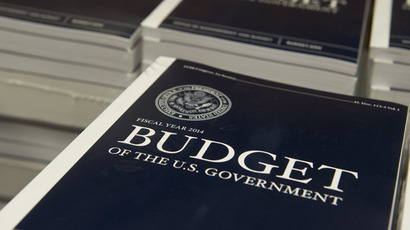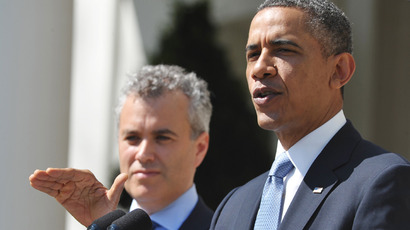Obama quietly strips anti-corruption provisions from STOCK Act

High-ranking federal employees will not be required to disclose financial information online, after President Obama signed an amendment to a bill that was meant to put an end to insider trading among members of Congress and government staffers.
The provisions to the Stop Trading on Congressional Knowledge (STOCK) Act were quietly approved by both chambers of Congress at the end of last week before being passed onto the president’s desk. The bill had previously been delayed several times before the White House announced on Monday that Obama had approved the changes.
The original STOCK Act was signed by the Obama administration last year in a highly publicized ceremony, during which he said the new law would restore the American public’s faith in the Washington elite. Congressional lawmakers have long been accused of profiting from stock information derived as a result of their position. A civilian moving money based on information gained in a similar fashion would be breaking the law.
“It’s a good first step,” Obama said after the passage last year. “And in the months ahead, Congress should do even more to help fight the destructive influence of money in politics and rebuild the trust between Washington and the American people.”
Last week, both chambers unanimously voted in favor of the amendments that will shield them from having to make such disclosures. In addition to the obvious implications of politicians giving themselves the option to omit financial information, the decision is notable in that it came among Congress' least-productive session on record.
In a delay earlier this year, Congress approved a study by the National Academy of Public Administration, which determined an online database would threaten the safety of public officials and make running for office less appealing for people working in the private sector.
Roughly 28,000 government officials would have been forced to make their financial records publicly available, according to The Hill, although that stipulation has drawn the ire of federal government employee unions.
Other, albeit less visible, reporting methods will still pertain to the president, vice president, members of Congress and candidates for Congress starting in 2014.
Perhaps most damaging to the STOCK Act, according to government transparency watchdog Open Secrets, was the removal of the following two provisions:
“Creation of the searchable, sortable, disclosure of the information contained in reports even for Congress, the president, vice president, the president’s cabinet and congressional candidates,” in addition to “Required electronic filing for Congress, the president, vice president, the president’s cabinet and congressional candidates, as well as high-level executive and congressional branch employees."














